Ambassador Dato’ Rohana Ramli of Malaysia hosted a reception at the grand ballroom of The Westin Chosun Hotel in Seoul on Sept. 3, 2014 to celebrate the 57th National Day of Malaysia.
Mindful of the tragic accidents faced by both Korea and Malaysia, Ambassador Ramili offered silent prayers for the Sewol Ferry victims and the victims of the Malaysian Airways MH370 and MH17.
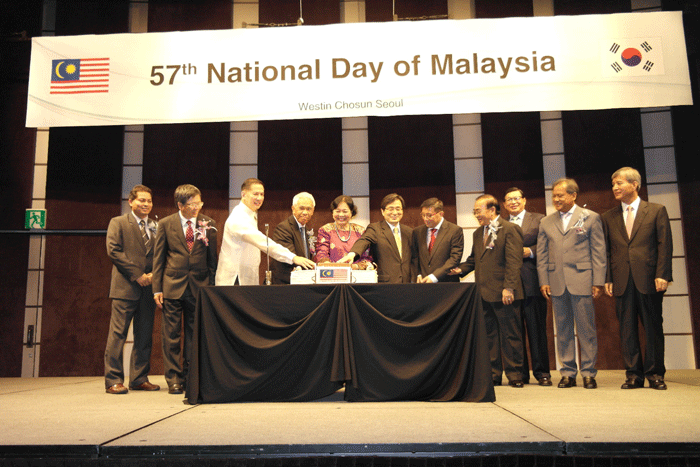
Another distinction of the party was the presentation of the National Anthem of Malaysia by two Malaysian students in Korea (President Muhammad Samsudian of the Malaysia Student Association in Korea and Malaysian Co-ed Fatin of Inha University). The Korean National Anthem was presented by four school girls from Gocheok Elementary School (namely, Shin You-Bin, Kang Hye-Rin, Kim Tae-eun and Shin Eun-A).
They were accorded added attention from the guests compared with the mechanical music at other parties.
Attending the party from the Korean society were Deputy Minister Shin Dong-ik of the Ministry of Foreign Affairs (MOFA) for Multilateral and Global Affairs, Vice Chairman Rep. Hong Il-pyo (Saenuri) of the Korea-Malaysia Parliamentary Friendship Association (KMPFA) of the National Assembly, Secretary General Rep. Mrs. Kang Eun-hee (Saenuri) of KMPFA), Korean Defense Intelligence Agency Foreign Intelligence Bureau Director Rear Admiral (Maj. Gen.) Lee Bum-Lim, ASEAN-Korea Center Secretary General Chung Hae-moon and Publisher-Chairman Lee Kyung-sik of The Korea Post.
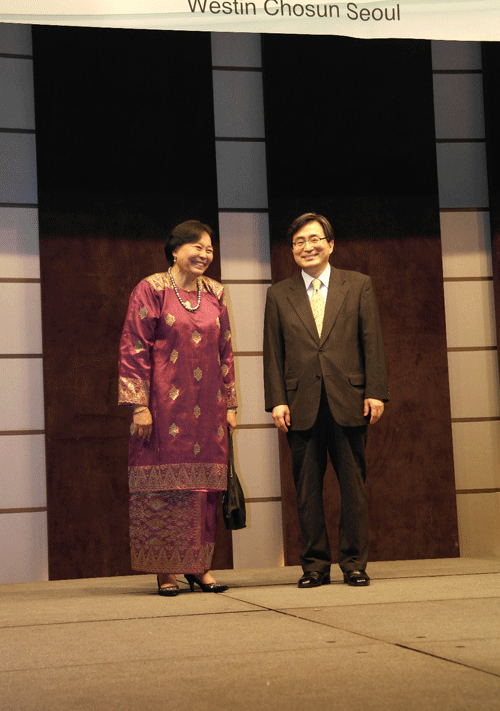
Vice Chairman Rep. Hong Il-pyo had a very favorable view of Malaysia and its people and culture as well as its government.
In a brief interview with The Korea Post, he said that Malaysia is an exemplary country in terms of successful attainment of economic development and highly praised Prime Minister Dr. Mahathir Mohamad of Malaysia as a representative head of government in Asia together with President Park Chung-hee of Korea and Prime Minister Lee Kwan-Yew of Singapore for successfully extricating their countries from the rut of chronical poverty. Rep. Hong noted that Malaysia is Korea’s complementary partner as well as a friendly competitor.
Hong admitted that as vice chairman of the Korea-Malaysia Parliamentary Friendship Association he has not been able to visit Malaysia yet but that he was fully aware that Malaysia was a wonderful country.
“Things are changing very rapidly in the international community,” he suggested, “and Korea and Malaysia should continue exploring new areas and new ways to further increase their bilateral cooperation and promote friendship overcoming whatever challenges they might face.” Then he assured that he will do whatever he could to help the two countries further develop and promote bilateral cooperation and friendship.”
Attendance from the Diplomatic Corps was among the largest in recent months, including many mission chiefs who included Ambassadors William Paterson of Australia, Ramzi Teymurov of Azerbaijan, Natallia Jhylevich of Belarus, Edmundo Sussumu Fujita of Brazil, Dato Haji Harun Ismail of Brunei Darussalam (dean of the Diplomatic Corps), Suth Dina of Cambodia, Grecia Fiodalicia Pichardo of Dominican Republic, Nicolas Fabian Trujillo Newlin of Ecuador, Hany Moawad Selim Labib of Egypt, Nikoloz Apkhazava of Georgia, Dionisios Sourvanos of Greece, John A. Prasetio of Indonesia, Sergio Mercuri of Italy, Bessho Koro of Japan, Ngovi Kitau of Kenya, Duishonkul Chotonov of Kyrgyzstan, Khamla Xayachack of Lao Republic, Soe Lwin of Myanmar, Kaman Singh Lama of Nepal, Raul S. Hernandez of the Philippines, Konstantin V. Vnukov of Russia, Tissa Wijeratne of Sri Lanka, Kulkumut Singhara Na Ayudhyya of Thailand, Hakan Okcal of Turkey, Myrat Mammetalyyev of Turkmenistan, Vasyl Marmazov of Ukraine, Bakhtier N. Ibragimov of Uzbekistan (CDA) and Huu Chi Pham of Vietnam.
There also were other Korean lawmakers who included Reps. Yang Chang Young and Jasmine Lee. Then there were MOFA Spokesman Noh Kwang-il, Director General Suh Jeong-in of the South Asian and Pacific Affairs Bureau of MOFAT, Secretary General Chung Hae-Moon of ASEAN-Korea Centre, President Haji Abdul Rahim Shin Man-Jong of the Korea Muslim Federation, Senior Vice President Kim Sang-Real of Daewoo E&C, Vice President Kim Seung-Mo of Hanwha, PoP and Opera Singer Gumico & Giuseppe Kim, Prof. Choi Jungwha
Corea Image Communication Institute and Ambassador Chun Bee-Ho of Gangwon Province for International Relations.
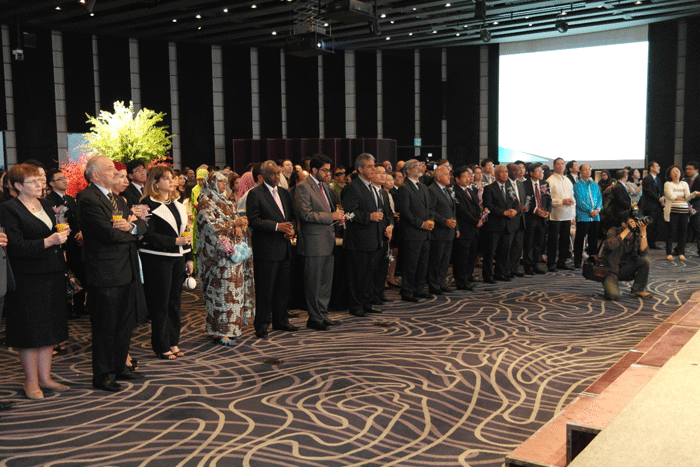
Rep. Kang, a lady lawmaker, came on a wheelchair, which indicated the degree of her affection for Malaysia and obviously, moreover, her personal interest in Malaysia and the Malaysian Embassy as well as the Ambassador.
Speaking to the guests in a welcome speech, Ambassador Ramli said: “Malaysia finds Korea’s achievements in many areas, particularly its economic development, amazing. Malaysia introduced the Look East Policy in 1982 to learn from Korea. This policy has shown many benefits as such it has been reintroduced. It is now known as the Second Wave of the Look East Policy (LEP). The difference from the first wave is in its focus. The Second Wave of LEP will develop more targeted programmes with specific outcomes to contribute towards Malaysia’s pursuit of becoming a high income country by year 2020.” Excerpts from the speech follow:
Before I begin my remarks, may I invite all of you to join me for a moment of silence in respect of those who had lost their lives in tragic incidents this year both in the Republic of Korea and Malaysia, i.e. the Sewol ferry incident, the missing of MH370 and slightly over a month ago the tragic incident of MH17. Our thoughts and prayers are with their families and loved ones.
On 31st of August this year, Malaysia had reached its 57th year of independence. AlhamdulIilah, with the Grace of Allah, Malaysia is able to celebrate today its National day as an independent, sovereign, democratic, peaceful and harmonious country.
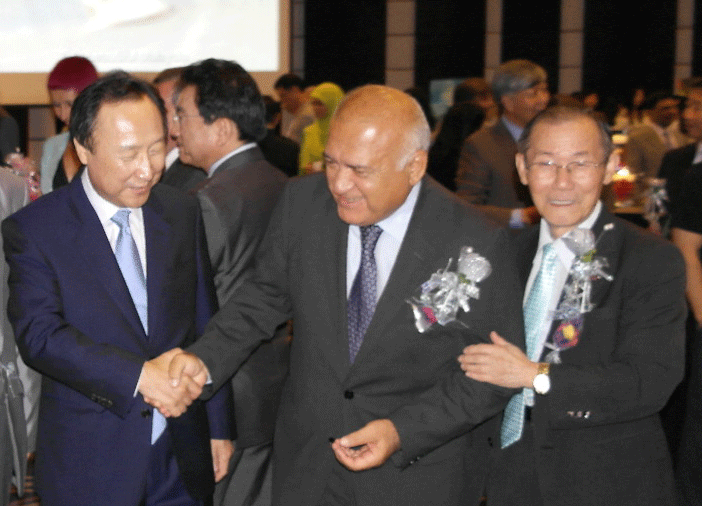
I would like to thank everyone for making the time to attend this auspicious occasion. This is my first national day reception in Seoul since I took office end of last year and I am truly honoured to have your presence this evening.
Malaysia’s journey as a nation from the beginning until today has been colourful indeed from all perspectives. In its early days of formation, Malaysia was basically an agricultural nation. Over the years, it has transformed itself into a trading and industrial nation. Malaysia also realized that it cannot solely depend on its domestic market for its economy and development. The reason being, realistically, as a nation of about 29 million people, Malaysia’s domestic market is not huge. Hence, becoming a trading and industrial nation is the most logical and beneficial way to create national wealth. After 57 years, Malaysia has largely reaps the benefits of the various policies and strategies sown. Obviously it was not a smooth journey. There were a few challenges encountered such as the Asian financial crisis. Nonetheless, Malaysia, like many other countries in the region, survived the crisis. Now, Malaysia is steadfast and working hard to make its Vision 2020 in becoming a develop nation a reality.
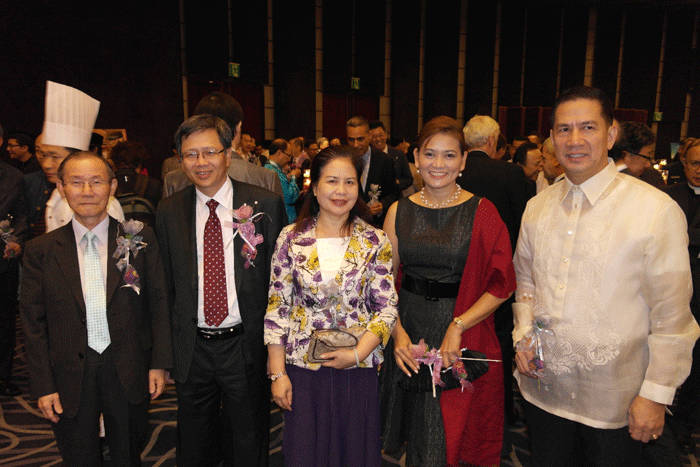
In our quest to create national wealth, Malaysia is thankful that we have made many friends. I must emphasize that these are not friends in names only but true friends in time of need. These are friends who had provided support and assisted Malaysia when it has to cope with the two tragic incidents this year.
I am of the view that one of the many lessons learnt from the two tragic incidents that Malaysia encountered was the importance of bilateral relations between nations. The Republic of Korea’s participation in the search for MH370 will never be forgotten by the Government and people of Malaysia. The strong bilateral relations between Malaysia and the Republic of Korea had made this possible. The diplomatic relations which, was established in 1960 have gained so much traction over the past 50 years and thus far, from our perspective, there have been no hiccups whatsoever. It is our hope that the current state of bilateral relations continues to remain strong and would be further enhanced and deepened with more substantive cooperation.
Malaysia finds Korea’s achievements in many areas, particularly its economic development, amazing. Malaysia introduced the Look East Policy in 1982 to learn from Korea. This policy has shown many benefits as such it has been reintroduced. It is now known as the Second Wave of the Look East Policy (LEP). The difference from the first wave is in its focus. The Second Wave of LEP will develop more targeted programmes with specific outcomes to contribute towards Malaysia’s pursuit of becoming a high income country by year 2020.
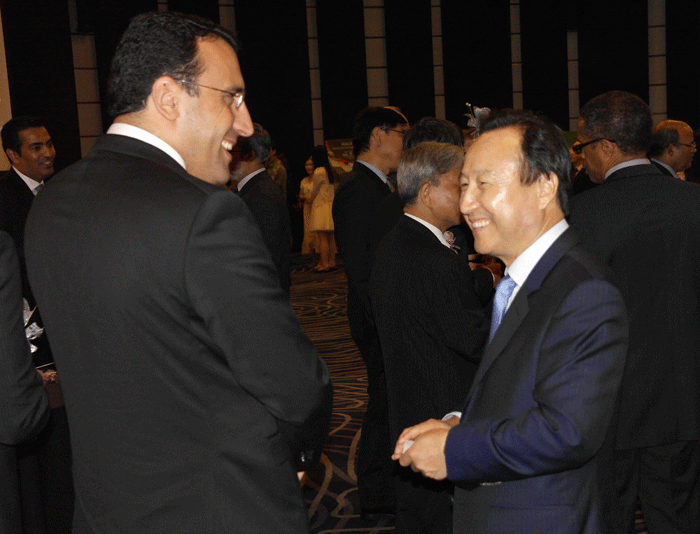
I would like now to mention briefly on trade, investment, tourism and education. In 2013, Republic of Korea was Malaysia’s 7th trading partner, 9th export destination and 7th import source. The Republic of Korea is also one of Malaysia’s main sources of foreign direct investment since 1980. In terms of investments, the Republic of Korea was the second largest foreign investor in the manufacturing sector for 2013. The investments were valued USD1.7 billion in 13 projects.
In terms of investment, Malaysia host more than 300 Korean companies, including many top conglomerates in the manufacturing sector and selected services sector including those that have established their regional operations in Malaysia, with investment more than USD4.0 billion. Malaysia welcomes more investments from Korea, particularly in new growth areas in high technology, high value-added, knowledge-based and skills-intensive industries.
Malaysia and the Republic of Korea have also been enjoying healthy numbers of tourist arrivals each year. There were 207,727 Malaysians who visited Korea in 2013. Meanwhile, as for the Koreans visiting Malaysia, it was recorded that approximately 274,622 Korean tourists visited Malaysia in 2013. As this year is Malaysia’s Visit Year, we hope the number of Korean visitors will exceed last year statistics.
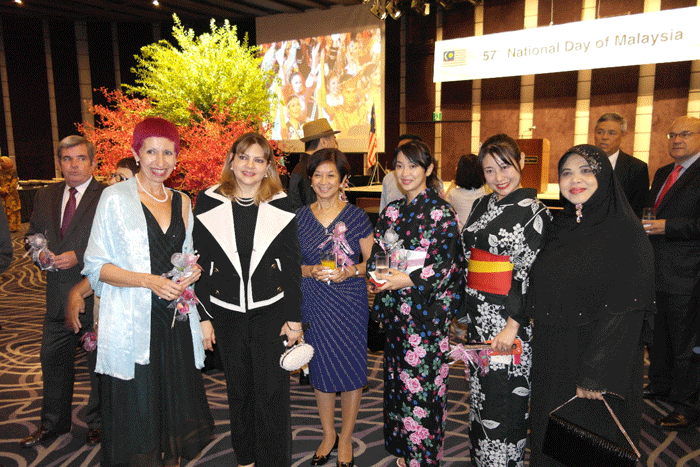
Besides trade and investment, Malaysia and the Republic of Korea bilateral relations have expanded into cooperation in other areas such as education. There are many Malaysians students studying in the various Universities in Korea. Koreans parents also are sending their children to study in the various international schools and higher institutions in Malaysia, taking advantage of the cost involved as well as the fact that Malaysia is only six (6) and half hour by flight away from Seoul.
In closing, may I now invite all present to join me in a toast: to the wellbeing and prosperity of the people of the Republic of Korea and Malaysia, as well as to the continued strong friendship between Malaysia and the Republic of Korea.

